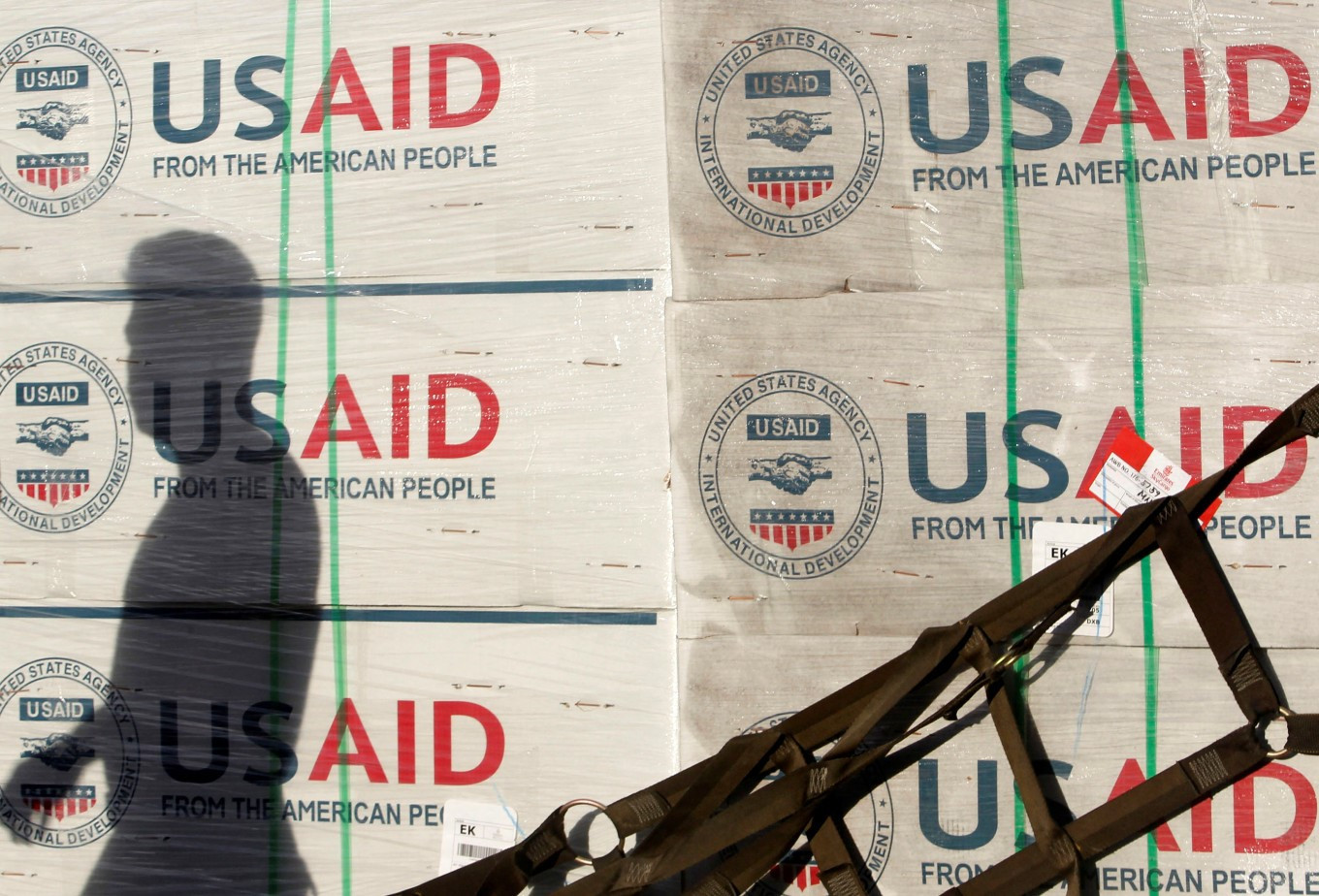News
Indonesia bracing for big cuts in US foreign aid
Tenggara Strategics February 12, 2025 In this file photo from 2013, the shadow of a Philippine Army personnel is cast on boxes of relief items from United States Agency for International Development (USAID) for the victims of super typhoon Haiyan, at Villamor Air Base in Manila November 13, 2
In this file photo from 2013, the shadow of a Philippine Army personnel is cast on boxes of relief items from United States Agency for International Development (USAID) for the victims of super typhoon Haiyan, at Villamor Air Base in Manila November 13, 2
Indonesian officials may openly dismiss the impact of the likely huge cuts in aid coming from the United States as minimal, but privately they know they will still affect many programs in health promotion, poverty alleviation and climate justice and a few other sectors that are crucial to the country’s 2030 Sustainable Development Goals (SDG) agenda.
Shortly after the Jan. 20 inauguration, the new administration of US President Donald Trump announced a 90-day freeze on all financial assistance to foreign countries managed by the US Agency for International Development (USAID). This week, the Department of Government Efficiency led by billionaire Elon Musk announced it is shutting down the agency and handing over all the aid affairs to the State Department.
When aid resumes after the 90-day freeze, many existing programs considered by the Trump government as not aligned with US government objectives would also be terminated. Almost certain to fall under the axe are programs related to family planning, given Trump’s strong anti-abortion stance; the promotion of diversity, equality and inclusivity, especially for women and LGBTQ communities; and climate change, given Trump’s skeptical view of global warming.
Other health programs not directly funded by USAID could also be cut or affected following Trump’s announcement to quit the World Health Organization (WHO), which runs many programs around the world, including Indonesia. Trump has also pulled the US out of the 2016 Paris Agreement which binds nations to commit to reducing carbon emissions.
Among the major USAID programs in Indonesia are those for family planning, maternal health, children’s malnutrition including stunting, polio vaccination, combatting tuberculosis and malaria and providing clean water to villagers. These programs support Indonesia’s quest to achieve the SDG objectives. Some USAID funds go for democracy and governance programs, including the promotion of free press.
The USAID website has been shut down this past week but some media reports say that Indonesia received US$153 million in funds from the agency in 2023. Aid money comes through other US government agencies, including State and Defense, but it’s not clear if they will be affected.
The Indonesian Health Ministry, among the biggest recipients of USAID funds in the country, has spoken while others are tightlipped, preferring to wait until they know more about the fate of the programs in their charge.
Deputy Health Minister Dante Saksono Harbuwono acknowledged that the USAID money will likely shrink but he stressed Indonesia is not heavily dependent on foreign aid for health programs, including for vaccinations and medicines. On combatting TB, for example, the government has already allocated Rp 500 billion and could possibly double the amount this year, he said.
He also said Indonesia can still draw $309 million from the Global Fund for combating TB, HIV/AIDS and malaria. A quick check on the Global Fund website shows that the United States is the largest contributor to the fund. The way USAID works is to channel the fund to development agencies, mostly in the US, but some are also Indonesia-based, which then work with Indonesian ministries, local governments or civil society organizations which carry out the programs.
The Indonesia AIDS Coalition (IAC) fear their programs will be severely affected as they get most of their money from the Global Fund, which received a third of its funds from USAID, executive director Aditya Wardhana was quoted as saying by the BBC. Besides supplying medicines, IAC manages field workers to accompany people with HIV/AIDS. Now it’s unclear whether these field workers will be getting paid and continue to work, he said.
Since 2020, USAID has allocated more than $800 million for various humanitarian and development programs in Indonesia, according to Metrotvnews.com.
It listed six existing USAID programs that could be closed down:
- A $3.2 million polio vaccination program in Aceh, Papua and other provinces.
- A smart city pilot project in Nusantara, a new town being built in East Kalimantan for Indonesia’s capital city to replace Jakarta.
- A $1.5 million program to procure medicines for 145,000 TB patients.
- A $4 million program to improve nourishment and healthcare for mothers and children in Papua, to reduce the prevalence of stunting.
- The “Clean Cities, Blue Ocean” program launched in 2021 to help Indonesia manage plastic waste, a menace in many urban centers.
- A program to support community-based projects to provide clean water and better sanitation systems in rural areas.
Given the mood in Washington, USAID programs that will fall under the axe would likely be terminated immediately halfway rather than being allowed to complete. Typically, these projects receive multi-year funding, some up to three years.
The takeover of USAID affairs by the State Department means those who manage the programs and the targeted beneficiaries will have to bear the confusion and uncertainty a little longer.
What we've heard
A USAID project employee said that institutions receiving donations from USAID were forced to halt their programs. "The activities are frozen because their funding source is from USAID," said this source. Currently, they said, management was still waiting for an explanation from USAID officials in Washington, DC. In Indonesia, USAID has disbursed around Rp 2.4 trillion (US$146.88 million) for various projects in Indonesia.

